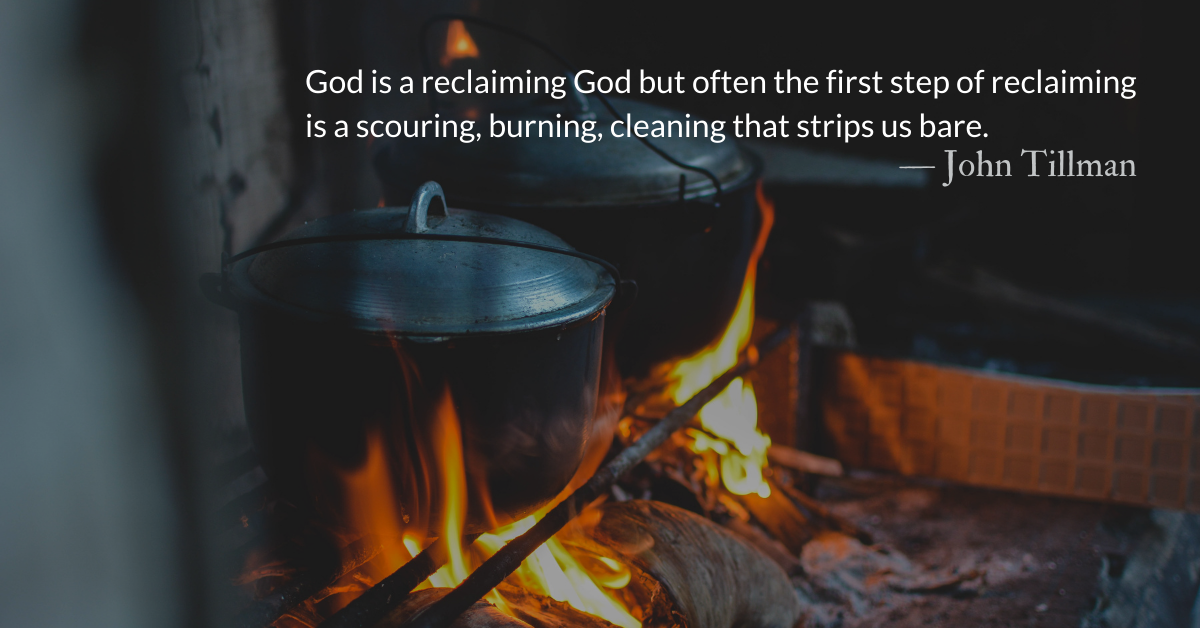Scripture Focus: Ezekiel 24.11-12
11 Then set the empty pot on the coals
till it becomes hot and its copper glows,
so that its impurities may be melted
and its deposit burned away.
12 It has frustrated all efforts;
its heavy deposit has not been removed,
not even by fire.
Psalm 72.4-7
4 May he defend the afflicted among the people
and save the children of the needy;
may he crush the oppressor.
5 May he endure u as long as the sun,
as long as the moon, through all generations.
6 May he be like rain falling on a mown field,
like showers watering the earth.
7 In his days may the righteous flourish
and prosperity abound till the moon is no more.
Reflection: Calling the Kettle
By John Tillman
Ezekiel’s pot is too filthy for use. Caked, rotted food is encrusted inside. Cooking anything in it would be unappetizing and unhealthy, perhaps poisonous.
This pot is black. This kettle is filthy. “It has frustrated all efforts,” God says.
If you have never stood looking at a pot with food so encrusted and burned to the bottom that you were tempted to just throw it away, then you’ve been luckier in the kitchen than I have. Yet, God did not cast away Jerusalem, nor us.
Psalm 72 tells us what the pot was intended to be—a blessing to the world. Saving the afflicted and the needy, crushing the oppressor, and causing the righteous to flourish was its purpose. (Psalm 72.4-7) Yet Jerusalem became the opposite of that.
Instead of crushing oppressors, they became them. Instead of saving the afflicted and the needy, they became the source of affliction and the cause of need. Instead of causing the righteous to flourish, they cultivated corruption into a flourishing garden.
This Psalm speaks of earthly kingship but prophetically points to a different king. David was not fooled by the golden age he lived in. He knew better than most that human leaders, especially himself, were incapable of bringing the kind of glowing, incandescent justice he wrote of. He looks instead, past his son, Solomon, to Jesus, the king God promised would come.
The bright, shiny kingdom David wrote from would become the blackened, filthy, pot of Ezekiel’s vision. We, or our nation or our church or our community, can easily be like this pot. It doesn’t happen all at once, it happens over time.
But we are blessed with a God who refused to simply toss away the worthless pot. God is a reclaiming God but often the first step of reclaiming is a scouring, burning, cleaning that strips us bare. The only option is to set the pot on a fire so hot that its metal glows, incandescent heat burning and melting away its gross deposits.
Have we frustrated God’s efforts?
Of what corruption do we need to be scoured?
What flaking varnishes of sin need to be stripped and sanded down?
How hot will the coals have to get before we allow our hardened hearts to melt and be purified?
Only then will God call our kettle back. Purified, he calls us to be used as a blessing to the world.
*And speaking of refurbishment and restoration of the corrupt…September 21, for millions of Christians across the world, is a day to celebrate the calling of Matthew, a publican and tax collector, a corrupt “pot” called and chosen to carry the account of Christ’s compassion to us in his gospel.
Divine Hours Prayer: The Refrain for the Morning Lessons
Purge me from my sin, and I shall be pure; wash me, and I shall be clean indeed. — Psalm 51.8
– Divine Hours prayers from The Divine Hours: Prayers for Summertime by Phyllis Tickle
Today’s Readings
Ezekiel 24 (Listen – 4:13)
Psalm 72 (Listen – 2:21)
Read more about Confession Destroys Denial
Nothing destroys denial except confession. Nothing repairs the damage of denial except repentance.
Read more about Blind to Injustice, Deaf to Oppression
Many modern, Western democracies would do well to take up this prayer’s wrenching confession of obsession with wealth and power at the expense of the disadvantaged.







